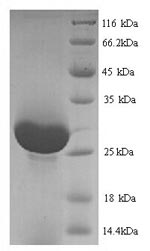Recombinant Rat Serine protease 1 (Prss1) is produced in a yeast expression system, covering amino acids 24 to 246 of the mature protein. The protein carries an N-terminal 6xHis tag, which helps with purification and detection. It reaches a purity greater than 90% as determined by SDS-PAGE, suggesting high-quality research applications. This product is designed for research use only.
Serine protease 1, also known as Prss1, appears to be a critical enzyme in the digestive system, involved in breaking down peptide bonds. It likely plays a vital role in various biological pathways, including protein digestion and absorption. Given its importance in proteolytic processes, Prss1 has become a significant focus in research related to enzymatic activity and regulation.
Potential Applications
Note: The applications listed below are based on what we know about this protein's biological functions, published research, and experience from experts in the field. However, we haven't fully tested all of these applications ourselves yet. We'd recommend running some preliminary tests first to make sure they work for your specific research goals.
Based on the provided information, recombinant rat Prss1 is produced in a yeast expression system as the full-length mature protein (24-246aa) with an N-terminal 6xHis-tag. Yeast expression systems provide eukaryotic folding machinery capable of supporting disulfide bond formation and some post-translational modifications, which are critical for serine protease activity and stability. Prss1 typically requires proper folding, activation (e.g., cleavage of a propeptide), and formation of a functional active site for enzymatic activity. The N-terminal 6xHis tag may interfere with the protein's native structure or activation process, as the N-terminus is often important for protease function. No validation data (e.g., enzymatic activity assays, circular dichroism) are provided. Therefore, while yeast expression increases the probability of correct folding compared to prokaryotic systems, the protein's folding status and bioactivity cannot be confirmed without experimental validation.
1. Enzyme Kinetics and Biochemical Characterization Studies
Serine protease activity depends on precise folding and active site formation; misfolding renders kinetic data biologically irrelevant. If the recombinant Prss1 is correctly folded and active, it can be used for enzyme kinetics studies to determine parameters like Km and Vmax using synthetic substrates. However, if misfolded or inactive (due to the His-tag interfering with activation or active site formation), kinetic assays would yield invalid results. The high purity supports reproducibility, but cannot compensate for the lack of activity.
2. Protein-Protein Interaction Studies
Protein-protein interactions require native conformation; misfolding compromises binding specificity. If properly folded, the His-tagged Prss1 could be used in pull-down assays to identify interaction partners, such as inhibitors or substrates. However, if misfolded, interaction domains may be altered, leading to non-specific binding or failure to recognize genuine biological partners. The tag may also sterically hinder some interactions.
3. Antibody Development and Validation
Antibodies can be produced against linear sequences, but conformational epitopes may be misrepresented if the protein is misfolded. This application is suitable as antibody generation primarily relies on linear epitope recognition, which is independent of folding status. The high purity and full-length sequence ensure comprehensive epitope coverage. However, if misfolded, antibodies may not optimally recognize conformational epitopes of native Prss1 in biological contexts.
4. Protease Inhibitor Screening and Development
Inhibitor screening requires a functional enzyme; misfolding invalidates high-throughput assays. If the recombinant Prss1 is active, it can be used for inhibitor screening in drug discovery. However, if inactive, screening would yield false negatives or invalid structure-activity relationships. The His-tag may also affect inhibitor binding if it alters the active site.
5. Comparative Proteomics and Species-Specific Studies
Comparative studies require native activity and structure; misfolding leads to erroneous evolutionary insights. If correctly folded and functional, the recombinant Prss1 enables valid comparative studies with orthologs from other species. However, if misfolded, any comparative data on substrate preference or inhibitor sensitivity would be misleading and not reflect biological differences.
Final Recommendation & Action Plan
Before employing this recombinant Prss1 in any functional application, it is essential to validate its folding and bioactivity through enzymatic assays (e.g., using fluorogenic substrates to confirm protease activity) and biophysical characterization (e.g., circular dichroism for secondary structure). If validation confirms activity, proceed with applications while considering the potential impact of the His-tag on function; if inactive, consider using tag-free protein or a different expression system (e.g., mammalian cells for proper activation). For immediate use, antibody development can proceed with the understanding that antibodies may require validation against native protein. Avoid kinetic, inhibitor screening, and comparative studies until bioactivity is confirmed. Always include appropriate controls (e.g., active protease standards) in experiments.






